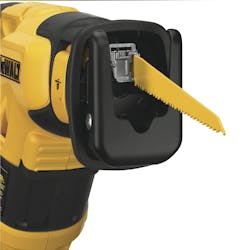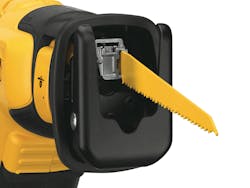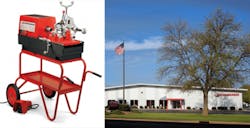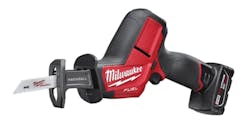Power tool survey: the most used power tools by contractors
CHICAGO — This March, CONTRACTOR surveyed readers to find out what are the most used corded and cordless power tools amongst contractors, where contractors prefer to purchase those tools, what voltage battery packs they use, among other questions. CONTRACTOR also asked a handful of tool manufacturers what type of tool trends they are seeing and what they are forecasting for the future.
The online Power Tool Use Survey was sent to a net random 23,900 subscribers. The majority of respondents are company owners — 51% — and 14% of respondents are in leadership positions, such as president, CEO or partner. There were 288 respondents.
Survey findings show that 82% of respondents are involved in residential construction; 69% are involved in commercial construction; 30% are involved in industrial construction; and 23% are involved in institutional construction. Sixty-nine percent of respondents are involved in remodeling/retrofit work and 25% are involved in new construction work.
Based on type of contracting work, respondent firms are engaged in air conditioning (62%); warm air heating (58%); plumbing (55%); hydronic heating (wet) (53%): radiant floor heating (43%); and bath/kitchen remodeling (40%).
What are some of your favorite tools? To continue the discussion about the most popular and most used tools, go to our new Plumbing Talk forum.
According to the survey, with the exception of floor drivers (13%), each corded power tool in the study is used by at least 40% of respondents. These corded power tools include the pipe threading machine, drill driver, demolition hammer, drain cleaning machine and pipe cutting machine. The most commonly used corded power tools include hammer drills at 87%, reciprocating saws at 86%, power drills at 85%, circular saws at 74% and rotary hammers at 70%.
For cordless power tools, the most commonly used are power drills at 84%, followed by drill drivers at 75% and reciprocating saws at 71%. About half of all respondents use cordless hammer drills (55%) and/or cordless circular saws (49%).
And where do contractors go to do their tool shopping?
According to the survey, most contractors are likely to purchase their power tools from industrial supply houses (59%) and/or home centers (51%), followed by plumbing wholesalers (39%); and coming in to a close third is the Internet (37%). Twenty-seven percent of respondents are purchasing tools at the hardware store, and 19% are utilizing a catalog to make purchases.
Survey respondents are most likely to use 18V battery packs for their cordless power tools (84%), with 12V battery packs following at a distant second (26%).
Manufacturers’ perspectives
According to Brian Allison, vice president/general manager of Rothenberger USA, key growth opportunities for the company are centered on alternative methods to join pipe.
“We continue to see growth in the press tool market,” said Allison. “In the U.S. the percentage of copper installations done by press technology is still behind the European market, which means there is a significant opportunity for growth in North America. Additionally, fitting manufacturers continue to produce new products for various types of pipe, which will allow for additional growth. In addition to press tools, there is large growth opportunity in plastic pipe fusion. Plastic pipe fusion involves joining types of plastic pipes by simultaneously heating both pieces and pressing them together to form a permanent bond. When done properly the two pieces will join together and appear as a single solid piece of pipe.”
For the plumbing and hydronic contractor, Rothenberger USA tools that were most popular in 2013 are Rothenberger’s portable pipe threaders since these threaders are lightweight and compact enough for the jobsite, yet durable and suitable for most every job, according to Allison.
What are other popular tools for contractors?
Other popular tools for these contractors are The Rothenberger 2SE and 50R, which are designed to thread pipe ½-in. to 2-in. diameters. The automatic thread stop, through-the-head oiler and quick change ball-detent die features makes this machine simple to use yet produce a high quality thread, and the nipple chuck accessory also allows the user to turn scrap material into useable custom length nipples.
New products added to Rothenberger’s line of inspection cameras for 2014, include the launch of the ROCAM 3 Multimedia Inspection Camera. The company plans to launch more products later this year.
According to Corey Dickert, director, product marketing for Milwaukee Tool, solution-driven innovation will continue to be the company’s mantra.
“Whether it is through the M12 & M18 Cordless systems or Hand Tool, Accessory or Test & Measurement lines, Milwaukee is still dedicated to delivering a steady stream of advanced solutions to contractors that offer increased productivity and ease of use,” said Dickert. “The mix of tools we are able to provide to increase productivity will continue to evolve as technology is improved and the industry explores alternative installation methods.”
Popular Milwaukee tools amongst plumbing and hydronic contractors include products like the M12 & M18 ProPEX Expansion Tools. According to Dickert, these tools continue to be very popular as they provide the industry’s fastest ProPex Installs, and in addition, as contractors continue to switch from soldering and welding to press connections on copper and stainless steel, Milwaukee has delivered the smallest and most intelligent solution on the market with their M12 & M18 Force Logic Press Tools.
For DeWalt, the DWE357 reciprocating saw is useful for contractors in the plumbing and hydronics trade. According to Jason Ducker, product manager at DeWalt, the saw’s compact design and configuration is ideal for professionals who have to make cuts in tight or challenging workspaces. The DWE357 also includes a four-position blade for horizontal or vertical cuts.
Also, this year, DeWalt has plans to launch portable LED lighting solutions for contractors, which will be especially handy for contractors working in dark and sometimes hard to reach places, such as plumbers, said Jim Watson, product manager at DeWalt.
About the Author
Candace Roulo
Candace Roulo, senior editor of CONTRACTOR and graduate of Michigan State University’s College of Communication Arts & Sciences, has 15 years of industry experience in the media and construction industries. She covers a variety of mechanical contracting topics, from sustainable construction practices and policy issues affecting contractors to continuing education for industry professionals and the best business practices that contractors can implement to run successful businesses.



